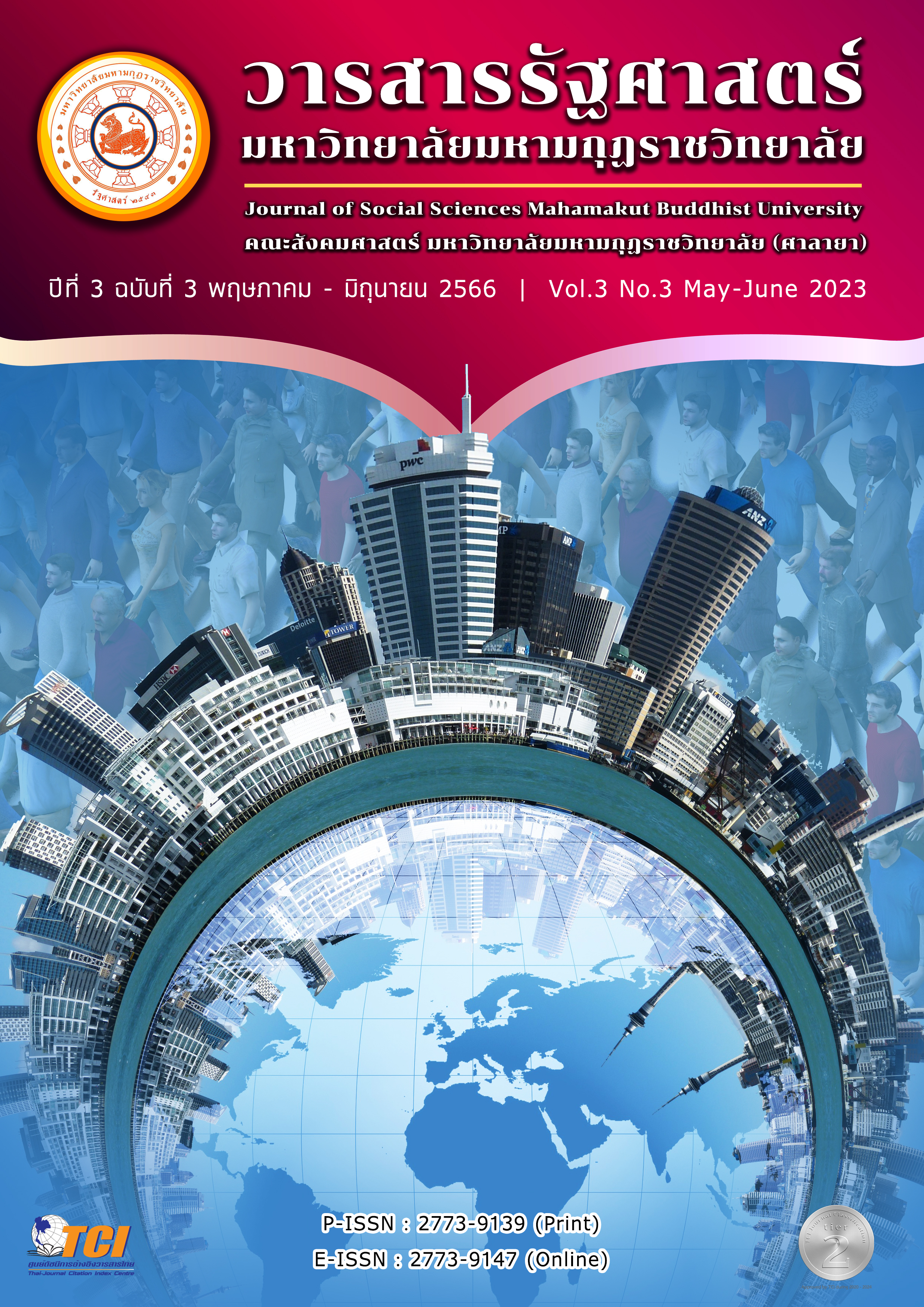THE DEVELOPMENT OF LEARNING AND TEACHING WITH YONISOMANASIKARN’S BUDDHIST TEACHING: A CASE STUDY OF ‘THE POLITICAL SCIENCE IN BUDDHIST’ COURSE OF FIRST-YEAR STUDENTS AT MAHAMAKUT BUDDHIST UNIVERSITY MAHAVAJIRALONGKORN RAJAVIDYALAYA CAMPUS
Main Article Content
Abstract
This research is aimed to compare the academic achievement of ‘The Political Science in Buddhism Course’ teaching and learning by arranging Yonisomanasikarn’s teaching and learning activity of first-year students in both pre and post-sessions of the course to compare the attitude towards ‘Political Science in Buddhism Course’teaching and learning by arranging Yonisomanasikarn’s teaching and learning activity of first-year students during pre and post study session. The research target group is 21 first-year students studying in the second semester of 2021 in the Political Science in Governance Program at Mahamakut Buddhist University Mahavajiralongkorn Rajavidyalaya Campus chosen by purposive sampling method. The research instrument is
1) 4-choice with 30 items of academic achievement test whose difficulty value (p) is from 0.51 to 0.72 and the Discrimination value (r) is from 0.32 to 0.67. Cronbach’s Alpha Confidence value reveals the Confidence Level at 0.96 and 2) Attitude test which is 25 items of the 5-level of the Likert Rating Scale which reveals the Discrimination value from 0.47 to 0.82. Cronbach’s Alpha Confidence value reveals the Confidence Level at 0.97. The statistics used in this research are Mean, Standard Deviation, and Paired t-test.
The research results revealed that; The research sample who enrolled in ‘The Political Science in Buddhism Course’ with Yonisomanasikarn teaching and learning activity of first-year students revealed a higher post-test score than the pre-test score at the significant level of .01 with a higher post-test score of both overall attitude score and individual attitude score at the significant level of .01. In conclusion, arranging the ‘Political Science in Buddhism Course’with the Yonisomanasikarn’s teaching method showed a higher level of academic achievement and a high level of attitude. Hence, lecturers are suggested to adapt the method with learning and teaching for the learners to achieve the course objectives.
Article Details

This work is licensed under a Creative Commons Attribution-NonCommercial-NoDerivatives 4.0 International License.
References
บรรพต แสนสุวรรณ. (2561). การพัฒนากิจกรรมเสริมสร้างทักษะชีวิต ตามแนวคิดโยนิโสมนสิการ สำหรับนักเรียนชั้นมัธยมศึกษา ในโรงเรียนขยายโอกาสทางการศึกษา. ใน รายงานการวิจัย. โครงการวิจัยและพัฒนานวัตกรรมแลกเป้า. สำนักงานเขตพื้นที่การศึกษาประถมศึกษาสกลนคร เขต 1.
บุญชม ศรีสะอาด. (2553). การวิจัยเบื้องต้น. พิมพ์ครั้งที่ 8. กรุงเทพมหานคร: สุวีริยาสาส์น.
บุญชม ศรีสะอาด. (2543). การวิจัยทางการวัดผลและประเมินผล. กรุงเทพมหานคร: สุวีริยาสาส์น.
ประสิทธิ์ นิ่มจินดา. (2541). การศึกษาไทย (การศึกษา 171). มหาสารคาม: มหาวิทยาลัยมหาสารคาม.
ประทีป เมธาคุณวุฒิ. (2545). หลักสูตรอุดมศึกษา : การประเมินและการพัฒนา. กรุงเทพมหานคร: นิชินแอดเวอร์ไทซิ่งกรุ๊ฟ.
ปรียาพร วงศ์อนุตรโรจน์. (2546). จิตวิทยาการศึกษา. กรุงเทพมหานคร: พิมพ์ดี.
พระธรรมปิฏก (ป.อ. ปยุต ฺโต). (2543 ก). ถึงเวลามารื้อปรับระบบพัฒนาคนกันใหม่. กรุงเทพมหานคร: กรมวิชาการ กระทรวงศึกษาธิการ.
พระธรรมปิฏก (ป.อ. ปยุต ฺโต). (2543 ข). ความคิดแหล่งสำคัญของการศึกษา. พิมพ์ครั้งที่ 2. กรุงเทพมหานคร: บริษัทสหธรรมิกจำกัด.
ล้วน สายยศ และอังคณา สายยศ. (2539). เทคนิคการวัดผลการเรียนรู้. กรุงเทพมหานคร: สุวีริยาสาส์น.
วัลลภา เทพหัสดิน ณ อยุธยา. (2543). การพัฒนาการเรียนการสอนระดับอุดมศึกษา. กรุงเทพมหานคร: จุฬาลงกรณ์มหาวิทยาลัย.
สมนึก ภัททิยธนี. (2546). เทคนิคการสอนและรูปแบบการเขียนข้อสอบแบบเลือกตอบวิชาคณิตศาสตร์เบื้องต้น. มหาสารคาม: คณะศึกษาศาสตร์ มหาวิทยาลัยมหาสารคาม.
สมถวิล เหตุรุน (2555). การพัฒนาความสามารถด้านการคิดอย่างมีวิจารณญาณของนักเรียนชั้นมัธยมศึกษาปีที่ 3 เรื่องวรรณกรรม กลุ่มสาระการเรียนรู้ภาษาไทยโดยใช้การสอน แบบโยนิโสมนสิการ. วิทยานิพนธ์ปริญญามหาบัณฑิต. สาขาวิชาหลักสูตรและการสอน. บัณฑิตวิทยาลัย: มหาวิทยาลัยมหาสารคาม.
สำนักงานคณะกรรมการอุดมศึกษา. (2551). คู่มือการประกันคุณภาพการศึกษาภายในสถานศึกษาระดับอุดมศึกษา. ฉบับปรับปรุง. กรุงเทพมหานคร: การพิมพ์.
สำนักงานคณะกรรมการการศึกษาแห่งชาติ. (2543). รูปแบบและภารกิจอุดมศึกษา. กรุงเทพมหานคร: วัฒนาพานิช.
Festinger, L. (1957). A theory of cognitive dissonance. Stanford: Stanford University.
Heider, Frits. (1958). The Psychology of interpersonal Relationship. New York: John Wiley Sons Lnc.
Rosenberg, M.J. (1956). “Cognitive structure and attitudinal affect.” Journal of Abnormal and. Social Psychology, 53, 367 – 372.
Osgood, C.E., Suci, G.J., & Tannenbaum, P.H. (1957). The measurement of meaning. Urbana: University of Illinois press.


